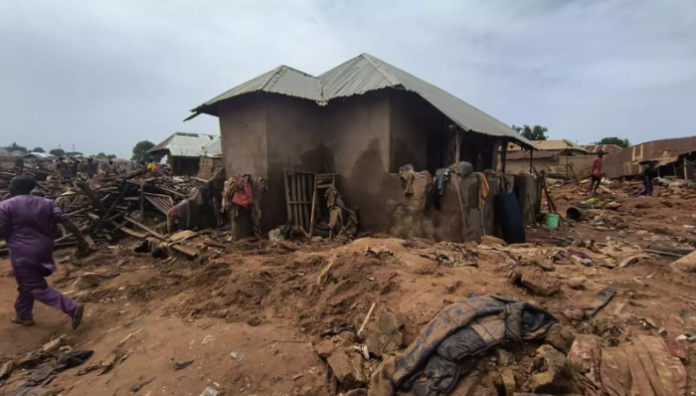Conflicting reports have emerged over the true death toll from last week’s catastrophic flood in Mokwa, Niger State, raising concerns that government figures may significantly understate the scale of the disaster.
Official figures released by the Niger State Emergency Management Agency and the National Emergency Management Agency (NEMA) report 153 confirmed fatalities from the flooding that followed days of heavy rainfall.
According to AFP, residents and traditional leaders insist the real number is significantly higher, with more than 3,000 residents displaced and over 500 remaining missing.
Local leaders told the BBC that at least 200 people had died, making the Mokwa disaster one of the deadliest floods in Nigeria in over six decades. The discrepancy in numbers has raised concerns about transparency in official reporting and the overall scale of the catastrophe.
“We no longer believe that survivors can be found,” said Musa Kimboku, Mokwa’s Deputy Vice-Chairman in a BBC report. “We have informed neighbouring villages to bury any corpse that they find.” The floods, caused by days of torrential rainfall, were worsened by human factors. Residents told AFP that debris blocked culverts along an abandoned railway track, causing water to build up behind clay walls that eventually gave way. The result was a torrent that flattened large parts of the community within hours.
District Head Muhammadu Aliyu confirmed the extent of destruction. “Some bodies have passed through the River Niger. Others are buried in the mud. We will start digging them out to prevent disease outbreaks,” he said.
As of Sunday, NEMA began distributing relief packages to displaced families. But locals say the aid effort is too little, too late, and many accuse the government of underreporting casualties. “Anybody that tells you this is the number of people that died is just guessing,” said Saliu Adamu, 45, a resident of Mokwa.
Adamu Yusuf, another resident, recounted losing nine family members—including his wife, son, and mother. “I watched helplessly as water washed away my family. I survived because I could swim,” he told the BBC. Only one body from his family has been recovered so far.
“I don’t know who rescued me,” Yusuf later told AFP, describing how he was knocked unconscious and woke up in a hospital. Standing amid the ruins of his home, he joined other residents, including children, digging through debris in search of bodies.
The stench of decaying corpses filled the air, with residents fearing many more are buried under the rubble. “I have never seen anything like this in my 42 years of existence,” said Adamu Usama, a civil engineer who lost 10 in-laws to the disaster, according to AFP.
“We saw the water carrying people but we cannot save (them), because we don’t know how to swim.”
Eyewitnesses report that bodies have been found as far as Rabba, more than an hour’s drive from Mokwa. Volunteers and disaster teams have recovered corpses nearly 10 kilometres from the community, many swept into the River Niger by the force of the water.
Infrastructure in Mokwa has also been severely damaged. Roads and bridges were washed away, paralysing local trade and transport. The only excavator on site was seen working to reinforce a small bridge on the community’s edge.
Although President Bola Tinubu said security forces had been deployed for disaster response, only a few soldiers and police officers were visible on Sunday, mainly easing traffic near the damaged bridge. The state’s governor, Mohammed Umar Bago, is currently in Saudi Arabia on a pilgrimage. His deputy, Yakubu Garba, reportedly visited the area, but many survivors said they were still waiting for meaningful assistance.
In 2024, NEMA recorded 321 flood-related deaths across 34 of Nigeria’s 36 states. The Mokwa tragedy now threatens to surpass that figure.
With search and rescue efforts officially halted and many bodies still unrecovered, survivors remain in limbo—mourning, searching, and questioning why more wasn’t done to prevent the disaster and why the true scale of their loss may never be fully acknowledged.
The BBC and AFP contributed to this report.
GUARDIAN NEWSPAPER


